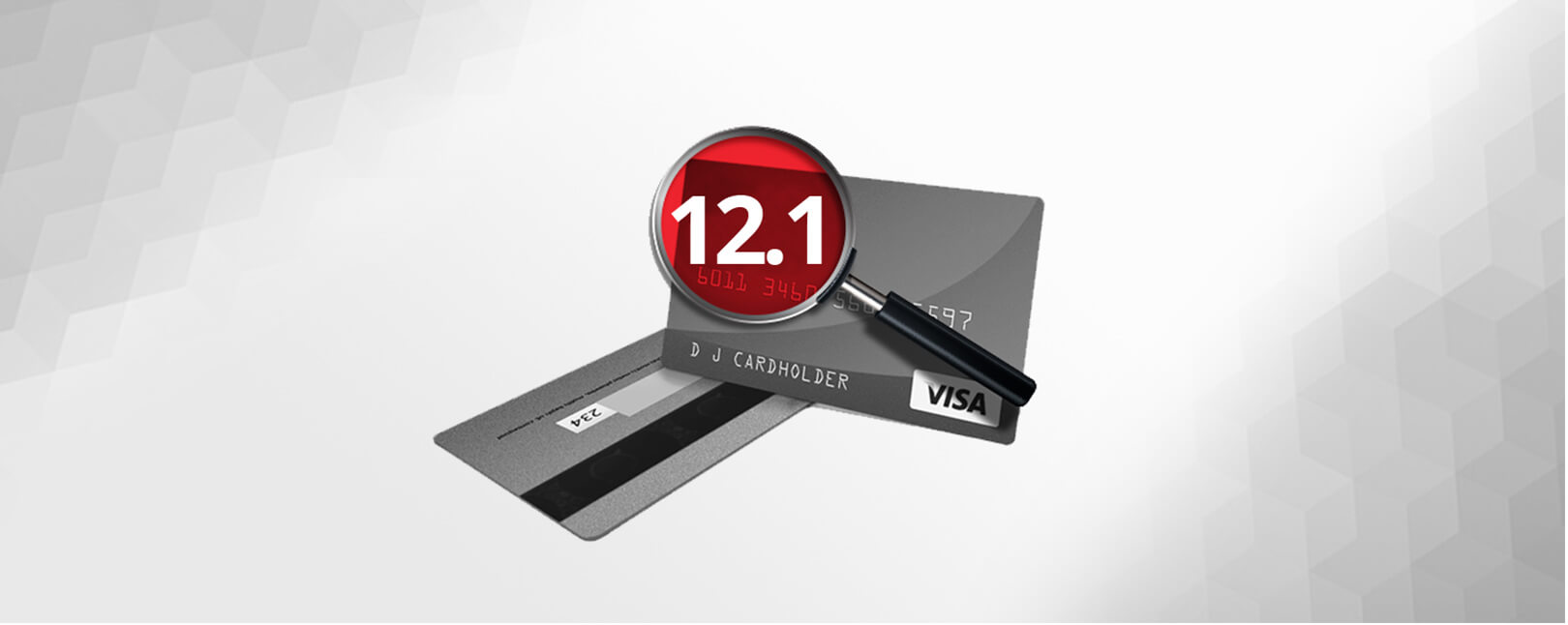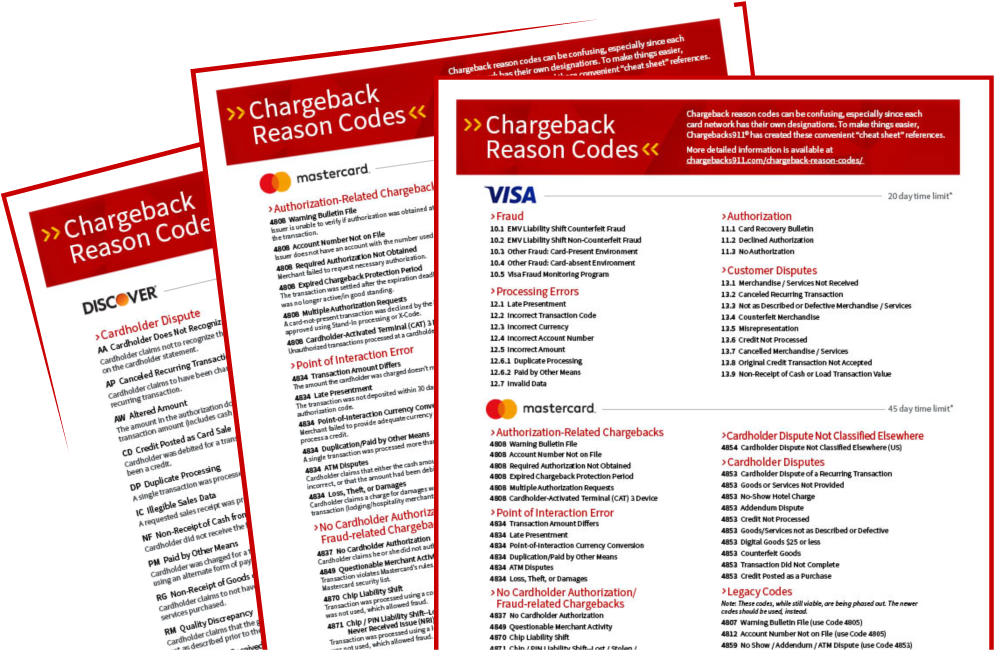Visa Chargeback Reason Code 12.1: Late Presentment
NOTE: As of April 2024, Visa no longer issues chargebacks using reason code 12.1. Chargebacks on transactions resulting from late presentment, which were previously filed using reason code 12.1, will now be filed using reason code 11.3 (“No Authorization”).
For the sake of simplicity and standardization, card networks like Visa have created a breakdown of the acceptable causes for a customer to dispute a credit card transaction by filing a chargeback. Each of these causes has a designated “reason code,” and banks assign the appropriate code to each case to show the given reason for the chargeback.
That sounds simple enough, but the reality is, the given reason for a chargeback may or may not be the true reason. Plus, each card network has its own set of reason codes—which, while nearly the same in function, nevertheless differ from one another. Keeping track of all these codes, along with the best ways to either fight or prevent each one, is challenging.
With that in mind, let’s take a look at Visa Reason Code 12.1: Late Presentment.
Reason Code 12.1 Chargebacks Are Completely Preventable.
We can show you how to protect yourself. Click to learn more.

What is Visa Reason Code 12.1?
Chargeback reason code 12.1 is an updated version of legacy reason code 74, which was phased out under the Visa Claims Resolution initiative. This code applies when a transaction is not deposited within the timeframe designated by Visa (see chart below). According to Visa regulations, if the transaction is not deposited within the allotted time, the issuer has 120 calendar days (for U.S. domestic transactions) to file a 12.1 chargeback. This window starts on either the transaction processing date, the transaction date (for ATM cash transactions), or the date of a PIN-authenticated debit transaction.
While this reason code takes the place of legacy code 74, there are some important distinctions. Previously, use of this code only applied if:
- the transaction was not filed in a timely manner, AND
- the account involved had since been closed.
In contrast, account status is not a factor with reason code 12.1. Also, reason code 74 could be assigned to any transaction that was deposited more than 180 days after the transaction date. This has no application in the case of reason code 12.1; the 120-day timeframe applies in all circumstances.
Visa Late Presentment Chargeback: Regular Timeframes
According to Visa, any transaction not sent to within the timeframe required will be considered a late presentment, meaning you will be liable for the amount involved:
-
- Visa Electron and ATM: Within 5 calendar days of the transaction date*
- Visa Prepaid Load Service (Visa ReadyLink): Within 2 calendar days of the transaction date
- Merchandise Returns and Credits: Within 5 calendar days of the transaction date
- All Other Transactions: Within 8 calendar days of the transaction date*
*Exceptions apply in various countries in the Asia-Pacific region. See the Visa Core Rules for more information.
Merchant Errors & Rights
Chargebacks of any kind are nothing but trouble for merchants…yet many chargebacks are the direct result of preventable merchant missteps. In the case of a late presentment chargeback, the cause is obvious: the merchant was late depositing the transaction.
So, what would keep a merchant from presenting a transaction for four months? It could simply be forgetfulness, but that seems unlikely to cause most late presentment reason code cases. One of the most common scenarios involves another reason code, 12.4: incorrect account number (formerly reason code 77).
Merchants receive a reason code 12.4 chargeback when they process transactions using a bad account number; one that doesn’t match anything the issuer has on file. This typically happens when the merchant doesn’t enter the account number correctly (for key-entered transactions), or misreports the number (for mail or telephone order transactions).
Once a chargeback with reason code 12.4 has been issued, the merchant will likely spot the error and try to submit a new transaction with the proper account number. Because the initial chargeback process takes so long, however, there’s little chance the resubmission will still fall within 120 days of the transaction. The result is an additional chargeback under reason code 12.1.
In most transaction disputes, merchants are at least protected by rules that limit the timeframe in which cardholders can file a chargeback. Since merchants themselves are the cause of chargebacks with a late presentment reason codes, even that protection does not apply.
Reason Code 12.1 Chargebacks: Causes & Prevention
Fortunately, because late presentment chargebacks are the result of a simple error on the part of the merchant, they are 100% preventable.
Merchants should deposit transactions as soon as possible. Ideally, they should be submitted on the same day as the sale. One should always submit transactions within the same business week as the initial sale (or within the timeframe specified in your merchant agreement).
Multi-location, centrally-accumulated merchants, like those in the travel and entertainment industry, should make deposits within 20 days of the purchase. Going beyond that time limit increases the chances that a customer will have forgotten the transaction or be unable to recognize it on a bank statement, and dispute the charge.
Disputing Reason Code 12.1 Chargebacks
While preventative measures on the part of merchants can prevent valid late presentment chargebacks, some illegitimate chargebacks may still slip through the cracks. Merchants who have evidence that refutes a claim should challenge the chargeback through Visa’s dispute process. Here are some steps merchants can take to more effectively dispute chargebacks with the Visa chargeback reason code 12.1:
If… |
Then… |
| You believe the transaction was completed within the time limit… | …provide evidence of the transaction date. |
| The transaction was completed later than the specified time limit… | …you must accept the dispute. |
| You’re aware of the issue and have already processed a credit or reversal for the transaction… | …provide documentation of the credit reversal, including the amount of the credit and the date it was processed. |
| The cardholder no longer disputes the transaction… | …provide a letter, email, or other documentation from the cardholder that clearly states they no longer dispute the transaction. |
Take a Wider View
Illegitimate late presentment chargebacks can be disputed. Valid chargebacks from Visa Reason Code 12.1, however, are the result of easily-preventable merchant errors, so it’s much more efficient to take a proactive stance. In fact, the same thing could be said of other chargeback reason codes, too: a truly effective chargeback management strategy must encompass prevention as well as disputing cases of friendly fraud.
Chargebacks911® can help your business manage all aspects of chargeback reason codes, with proprietary technologies and experience-based expertise. Contact us today for a free ROI analysis to learn how much more you could save.










